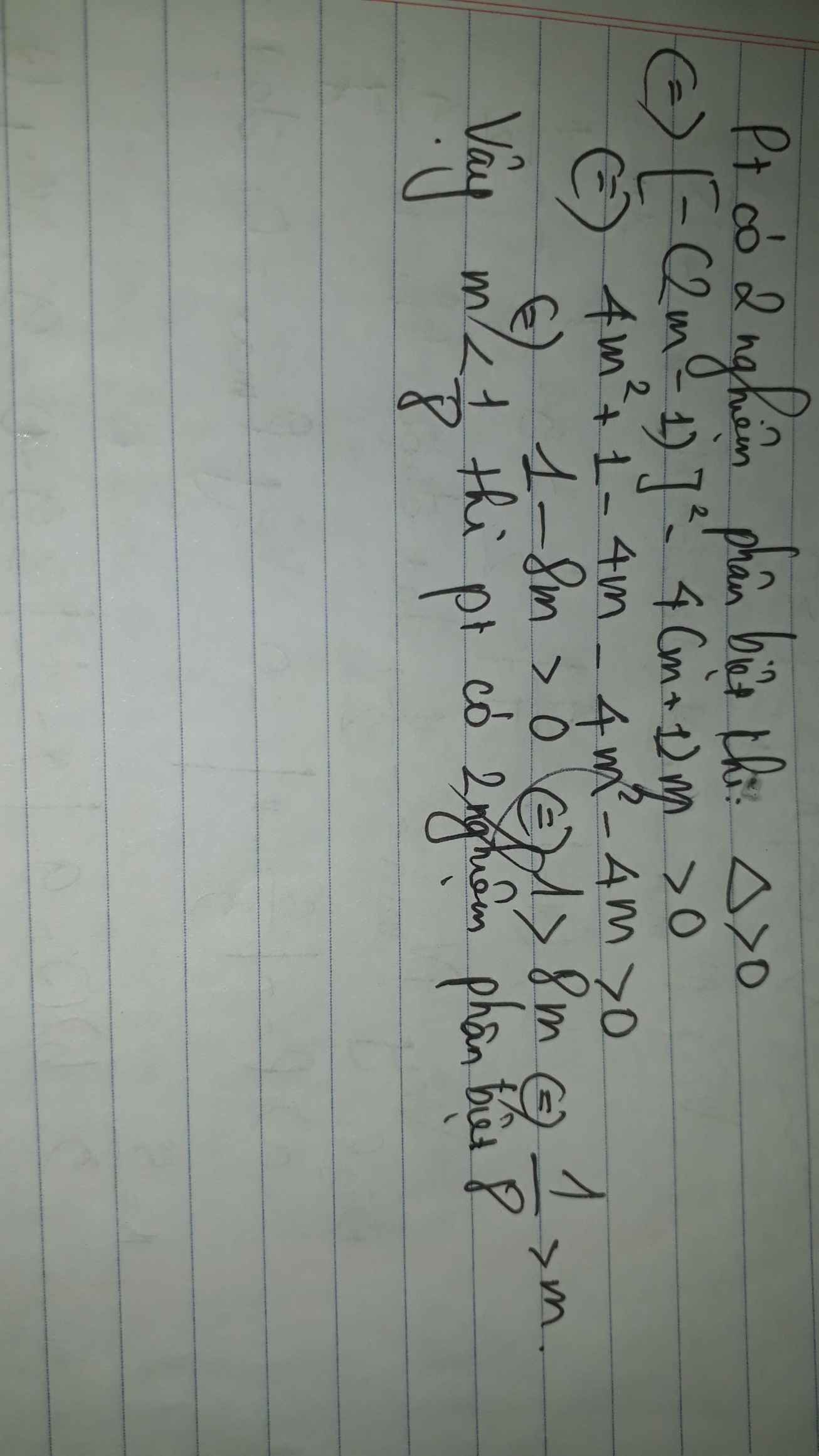Tìm điều kiện tham số m để bất phương trình \(x^2-\left(m+2\right)x+\left(3m^2+1\right)\)<0 có nghiệm
Hãy nhập câu hỏi của bạn vào đây, nếu là tài khoản VIP, bạn sẽ được ưu tiên trả lời.


\(\Delta=\left(2m-1\right)^2-4\cdot\left(m+1\right)\cdot m\)
\(=4m^2-4m+4-4m^2-4m\)
\(=-8m+4\)
Để phương trình có hai nghiệm phân biệt thì
\(\left\{{}\begin{matrix}m+1\ne0\\-8m+4>0\end{matrix}\right.\Leftrightarrow\left\{{}\begin{matrix}m\ne1\\-8m>-4\end{matrix}\right.\)
\(\Leftrightarrow\left\{{}\begin{matrix}m\ne1\\m< \dfrac{1}{2}\end{matrix}\right.\Leftrightarrow m< \dfrac{1}{2}\)

\(f\left(x\right)=\left(3m-4\right)x^2-2\left(m-2\right)x+m-1< 0\)
\(TH1:3m-4=0\Leftrightarrow m=\dfrac{4}{3}\Rightarrow f\left(x\right)=\dfrac{4}{3}x+\dfrac{1}{3}< 0\Leftrightarrow x< -\dfrac{1}{4}\left(ktm\right)\)
\(TH2:3m-4>0\Leftrightarrow m>\dfrac{4}{3}\Rightarrow f\left(x\right)< 0\forall x>1\Leftrightarrow\left\{{}\begin{matrix}\Delta'>0\\x1\le1< x2\end{matrix}\right.\Leftrightarrow\left\{{}\begin{matrix}\left(m-2\right)^2-\left(m-1\right)\left(3m-4\right)>0\\\left(x1-1\right)\left(x2-1\right)\le0\Leftrightarrow x1.x2-\left(x1+x2\right)+1\le0\\\\\end{matrix}\right.\)
\(\Leftrightarrow\left\{{}\begin{matrix}0< m< \dfrac{3}{2}\\\dfrac{m-1}{3m-4}-\dfrac{2\left(m-2\right)}{3m-4}+1\le0\Leftrightarrow\dfrac{1}{2}\le m< \dfrac{4}{3}\end{matrix}\right.\)
\(\Leftrightarrow\dfrac{1}{2}\le m< \dfrac{4}{3}\left(màm>\dfrac{4}{3}\right)\Rightarrow loại\)
\(TH3:3m-4< 0\Leftrightarrow m< \dfrac{4}{3}\)
\(\Rightarrow\left[{}\begin{matrix}\left\{{}\begin{matrix}\Delta'=0\Leftrightarrow m=0\left(tm\right)\\x=\dfrac{2\left(m-2\right)}{3m-4}=\dfrac{1}{2}\notin\left(1;+\infty\right)\left(tm\right)\end{matrix}\right.\\\Delta'< 0\Leftrightarrow\left[{}\begin{matrix}m< 0\\m>\dfrac{3}{2}\end{matrix}\right.\\x1< x2\le1\left(1\right)\\\end{matrix}\right.\)
\(\left(1\right)\Leftrightarrow\left\{{}\begin{matrix}\Delta'>0\Leftrightarrow0< m< \dfrac{3}{2}\\\left(x1-1\right)\left(x2-1\right)\ge0\\x1+x2-2< 0\end{matrix}\right.\Leftrightarrow\left\{{}\begin{matrix}0< m< \dfrac{3}{2}\\\dfrac{m-1}{3m-4}-\dfrac{2\left(m-2\right)}{3m-2}+1\ge0\\\dfrac{2\left(m-2\right)}{3m-4}-2< 0\end{matrix}\right.\)
\(\Leftrightarrow0< m\le\dfrac{1}{2}\)
\(\Rightarrow\left[{}\begin{matrix}m\le0\\0< m\le\dfrac{1}{2}\end{matrix}\right.\)
thay \(\dfrac{1}{2}\) vào ra x<1/5 hoặc x>1 chứ có phải Vx>1 đâu ạ

Ta có: \(\text{Δ}=\left(1-4m\right)^2-4\left(3-2m\right)\left(1-2m\right)\)
\(=16m^2-8m+4-4\left(2m-3\right)\left(2m-1\right)\)
\(=16m^2-8m+4-4\left(4m^2-2m-6m+3\right)\)
\(=16m^2-8m+4-4\left(4m^2-8m+3\right)\)
\(=16m^2-8m+4-16m^2+32m-12\)
\(=24m-8\)
Để phương trình có hai nghiệm phân biệt thì
\(\left\{{}\begin{matrix}3-2m\ne0\\24m-8>0\end{matrix}\right.\Leftrightarrow\left\{{}\begin{matrix}2m\ne3\\24m>8\end{matrix}\right.\)
\(\Leftrightarrow\left\{{}\begin{matrix}m\ne\dfrac{3}{2}\\m>\dfrac{1}{3}\end{matrix}\right.\)

Ta có :
\(x^2-(8m+1)x+15m^2+3m\leq 0 \\ \Leftrightarrow (x-3m)(x-5m-1) \leq 0\\ \Leftrightarrow x\in [3m;5m-1] \ hoặc \ x\in[5m-1;3m] \)
Độ dài của S trên trục số là:
\(|5m-1-3m|>3 \\ \Leftrightarrow |2m-1| > 3 \\ \Leftrightarrow 2m-1 > 3 \ hoặc \ 2m-1 <-3\\\Leftrightarrow m>2 \ hoặc\ m<-1\)

\(\Delta=\left[-2\left(m+1\right)\right]^2-4\left(m^2+4\right)\)
\(=4m^2+8m+4-4m^2-16\)
\(=8m-12\)
Để pt có 2 nghiệm thì \(\Delta>0\)
\(\Leftrightarrow8m-12>0\Leftrightarrow m>\dfrac{3}{2}\)
Theo hệ thức Vi-ét,ta có: \(\left\{{}\begin{matrix}x_1+x_2=2\left(m+1\right)\left(1\right)\\x_1x_2=m^2+4\end{matrix}\right.\)
\(\left(1\right)\rightarrow x_2=2\left(m+1\right)-x_1\)
\(x_1^2+2\left(m+1\right)x_2=3m^2+16\)
\(\Leftrightarrow x_1^2+2\left(m+1\right)\left[2\left(m+1\right)-x_1\right]=3m^2+16\)
\(\Leftrightarrow x_1^2+4\left(m+1\right)^2-2x_1\left(m+1\right)=3m^2+16\)
\(\Leftrightarrow x_1^2+4m^2+8m+4-2x_1\left(m+1\right)=3m^2+16\)
\(\Leftrightarrow x_1^2+m^2+8m-12-2x_1\left(m+1\right)=0\)
\(\Leftrightarrow x_1^2+m^2+8m-12-x_1\left(x_1+x_2\right)=0\)
\(\Leftrightarrow x_1^2+m^2+8m-12-x_1^2-x_1x_2=0\)
\(\Leftrightarrow m^2+8m-12-m^2-4=0\)
\(\Leftrightarrow m^2+8m-16=0\)
\(\Leftrightarrow\left[{}\begin{matrix}m=-4+4\sqrt{2}\left(tm\right)\\m=-4-4\sqrt{2}\left(ktm\right)\end{matrix}\right.\)
Vậy \(m=\left\{-4+4\sqrt{2}\right\}\)

- Với \(m=\dfrac{1}{2}\) ko thỏa mãn
- Với \(m\ne\dfrac{1}{2}\)
\(\Leftrightarrow\left(2m-1\right)x^3-\left(2m-1\right)x^2-\left(m-2\right)x^2+\left(m-4\right)x+2\ge0\)
\(\Leftrightarrow\left(2m-1\right)x^2\left(x-1\right)-\left(x-1\right)\left[\left(m-2\right)x+2\right]\ge0\)
\(\Leftrightarrow\left(x-1\right)\left[\left(2m-1\right)x^2-\left(m-2\right)x-2\right]\ge0\) (1)
Do (1) luôn chứa 1 nghiệm \(x=1\in\left(0;+\infty\right)\) nên để bài toán thỏa mãn thì cần 2 điều sau đồng thời xảy ra:
+/ \(2m-1>0\Rightarrow m>\dfrac{1}{2}\)
+/ \(\left(2m-1\right)x^2-\left(m-2\right)x-2=0\) có 2 nghiệm trong đó \(x_1\le0\) và \(x_2=1\)
Thay \(x=1\) vào ta được:
\(\left(2m-1\right)-\left(m-2\right)-2=0\Leftrightarrow m=1\)
Khi đó: \(x^2+x-2=0\) có 2 nghiệm \(\left[{}\begin{matrix}x_1=-2< 0\left(thỏa\right)\\x_2=1\end{matrix}\right.\)
Vậy \(m=1\)

Bài 1 \(\left\{{}\begin{matrix}x^2-3x-4\le0\\\left(m-1\right)x\ge2\end{matrix}\right.\Leftrightarrow\left\{{}\begin{matrix}-1\le x\le4\\\left(m-1\right)x\ge2\end{matrix}\right.\)
Nếu m = 1, hệ vô nghiệm
Nếu m ≠ 1, hệ tương đương
\(\left[{}\begin{matrix}\left\{{}\begin{matrix}-1\le m< 1\\x\le\dfrac{2}{m-1}\end{matrix}\right.\\\left\{{}\begin{matrix}1< m\le4\\x\ge\dfrac{2}{m-1}\end{matrix}\right.\end{matrix}\right.\)
Hệ có nghiệm khi một trong hai hệ trong hệ ngoặc vuông có nghiệm ⇔ \(\left[{}\begin{matrix}\left\{{}\begin{matrix}-1\le m< 1\\\dfrac{2}{m-1}\ge-1\end{matrix}\right.\\\left\{{}\begin{matrix}1< m\le4\\\dfrac{2}{m-1}\le4\end{matrix}\right.\end{matrix}\right.\)
⇔ \(\left[{}\begin{matrix}\left\{{}\begin{matrix}-1\le m< 1\\-2\le1-m\end{matrix}\right.\\\left\{{}\begin{matrix}1< m\le4\\2\le4m-4\end{matrix}\right.\end{matrix}\right.\Leftrightarrow\left[{}\begin{matrix}-1\le m< 1\\\dfrac{3}{2}\le m\le4\end{matrix}\right.\)

Để BPT có nghiệm \(\Leftrightarrow\Delta>0\)
\(\Rightarrow\left(m+2\right)^2-4\left(3m^2+1\right)>0\)
\(\Leftrightarrow-11m^2+4m>0\Leftrightarrow0< m< \frac{4}{11}\)